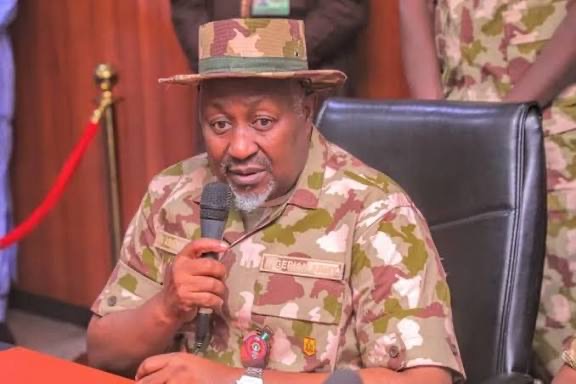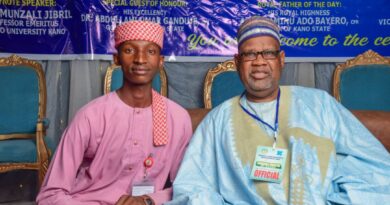Turning the Tide Against Insecurity: Mohammed Badaru Abubakar’s Steady Hands at the Helm of Nigeria’s Defence
By Ali Zakirai
For almost two decades, insecurity has posed one of the greatest challenges to Nigeria’s unity and stability. From terrorism in the Northeast to banditry in the Northwest, kidnappings in the North-Central, and oil theft in the South, these threats have stretched the country’s security architecture. However, in the past year, a renewed sense of optimism has begun to emerge, and much of that credit goes to the pragmatic and focused leadership of the Minister of Defence, Mohammed Badaru Abubakar. Since assuming office, Badaru has brought to the Ministry of Defence a unique blend of discipline, coordination, and strategic foresight that is beginning to yield visible results in the fight against terrorism and banditry.
As a former Governor of Jigawa State, Mohammed Badaru Abubakar earned a reputation for transparency, accountability, and effective governance. He has since transferred these same qualities to the defence sector, where he has emphasized results over rhetoric. Under his stewardship, the Nigerian Armed Forces have recorded remarkable progress in reclaiming territories, neutralizing threats, and restoring peace to several previously volatile communities. His approach has been grounded in strategy and coordination rather than brute force, ensuring that every operation is driven by intelligence and inter-agency collaboration.
Since he assumed leadership of the Ministry, Nigeria has witnessed one of its most successful periods in counterterrorism and anti-banditry operations. Official reports indicate that more than nine thousand terrorists, bandits, and kidnappers have been neutralized, while over seventeen thousand suspects have been arrested across different theatres of operation. The Armed Forces have also recorded significant success in securing the voluntary surrender of insurgents and their families. So far, more than twenty-four thousand terrorists have laid down their arms, signaling a major breakthrough in Nigeria’s deradicalization and rehabilitation efforts. These achievements not only demonstrate improved military efficiency but also highlight Badaru’s commitment to adopting a human-centered approach that focuses on both security and reconciliation.
Equally significant is the success recorded in the rescue of kidnapped victims. Thousands of men, women, and children who were abducted by bandits and insurgents have been reunited with their families, thanks to coordinated military offensives. Over four thousand six hundred hostages have been rescued in the past year alone, while broader operations have seen nearly ten thousand victims regain their freedom. This has brought immense relief to families and restored confidence among rural dwellers who for years lived under the constant threat of abduction. In states like Zamfara, Katsina, Kaduna, and Niger, there has been a notable reduction in reported cases of kidnappings, an indication that the government’s renewed offensive is yielding concrete results.
Perhaps one of the most remarkable aspects of Badaru’s leadership is his success in fostering synergy among Nigeria’s security agencies. For the first time in many years, the Army, Navy, Air Force, Police, and Civil Defence Corps are working seamlessly under a unified command framework. Intelligence is being shared more effectively, and operations are now more coordinated and precise. This improved collaboration has led to the dismantling of terrorist cells, interception of illegal arms shipments, and disruption of criminal supply lines that had long sustained insurgent activities. His insistence on coordinated intelligence-driven operations has also contributed to the significant decline in attacks along major highways that were once notorious for ambushes, such as the Abuja–Kaduna and Birnin Gwari–Kaduna routes.
Beyond the battlefield, Badaru has also made troop welfare and logistics a top priority. He understands that the strength of any army lies not only in its weapons but also in the morale of its personnel. To this end, he has overseen the regular payment of allowances, provision of improved living conditions, and enhanced medical support for soldiers and their families. This renewed attention to welfare has rekindled morale among troops, reduced cases of desertion, and strengthened the resolve of personnel engaged in frontline operations. Complementing this effort is the modernization of Nigeria’s defence infrastructure through the procurement of new military hardware and technology to enhance operational efficiency.
In addition to combating terrorism and banditry, the Defence Minister has extended his leadership to the protection of Nigeria’s economic assets, particularly in the Niger Delta region. His leadership has intensified efforts to curb oil theft and pipeline vandalism, two long-standing challenges that have significantly undermined national revenue. Through coordinated security operations, several illegal refineries have been destroyed, vessels impounded, and storage pits dismantled. These actions have contributed to improved oil output and restored some measure of stability to the region’s economy.
The statistics and outcomes of the past year reflect a Defence Ministry that is working with renewed purpose and vision. Under Mohammed Badaru Abubakar’s leadership, the Armed Forces have become more professional, responsive, and accountable. Communities that once lived in fear are now experiencing a return to normalcy. Markets have reopened, thousands of farmers have gone back to their fields, and children are returning to school in areas that were once under siege. These changes are the product of a leadership style that values strategy, discipline, and measurable impact over empty promises.
Mohammed Badaru Abubakar’s achievements at the Ministry of Defence align perfectly with President Bola Ahmed Tinubu’s broader vision of ensuring national security and stability. His leadership reflects a deep understanding of Nigeria’s security dynamics and the need for long-term solutions rather than quick fixes. In just over a year, he has proven that insecurity can indeed be tackled through a combination of strong leadership, strategic coordination, and unwavering commitment.
Today, Nigerians are beginning to see the results of a coordinated security strategy that is rebuilding trust and restoring hope. The Defence Minister’s steady and disciplined approach is gradually redefining Nigeria’s security architecture and inspiring renewed faith in the capacity of the Armed Forces. In a time when the nation desperately needs peace, Mohammed Badaru Abubakar stands out as a symbol of focus, resilience, and transformation — a man whose leadership is not only defending Nigeria but also shaping its future.
Ali is a Public Relations expert, and he writes from Kano and can be reached via Trustafricamedia@gmail.com





